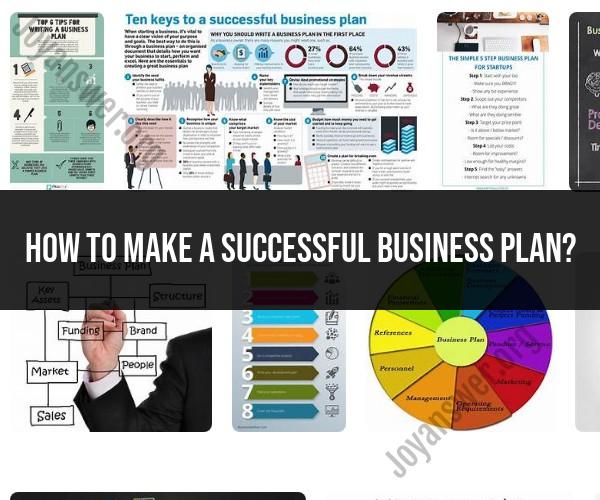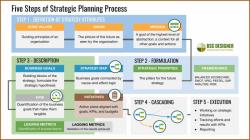How to make a successful business plan?
Creating a successful business plan is a critical step in launching or growing a business. A well-crafted business plan serves as a roadmap for your business, helping you set clear objectives and strategies. Here are the key steps and strategies to create a successful business plan:
1. Executive Summary:
- Start with a concise executive summary. This section provides an overview of your business, including its mission, vision, and the problem or need it addresses.
2. Company Description:
- Describe your company in detail, including its history, location, legal structure, and ownership. Explain your business's mission, values, and what sets it apart from competitors.
3. Market Research:
- Conduct thorough market research to understand your target market, industry trends, and competitors. Identify your target audience, their needs, and preferences.
4. Product or Service Description:
- Explain what your products or services are, how they benefit customers, and their unique selling points. Include details about pricing and how your offerings meet market demands.
5. Marketing and Sales Strategy:
- Describe your marketing and sales approach. Include a marketing plan that outlines how you'll reach and attract customers. Explain your sales strategy and distribution channels.
6. Organizational Structure:
- Outline your company's organizational structure, including key personnel and their roles. Provide resumes or bios of key team members.
7. Financial Projections:
- Present financial forecasts, including income statements, balance sheets, and cash flow statements. Include revenue projections, expenses, and break-even analysis.
8. Funding Requirements:
- If you're seeking funding, detail how much capital you need and how you plan to use it. Explain the type of financing you're seeking (e.g., loans, investors) and the terms.
9. SWOT Analysis:
- Conduct a SWOT (Strengths, Weaknesses, Opportunities, Threats) analysis. Identify internal and external factors that can affect your business.
10. Operations Plan:
- Describe how your business will operate on a day-to-day basis. Include information on suppliers, production processes, and quality control.
11. Milestones and Metrics:
- Set specific milestones and key performance indicators (KPIs) to track the progress of your business. Define how you'll measure success.
12. Risk Assessment:
- Identify potential risks and challenges your business may face and provide strategies for mitigating or managing them.
13. Appendices:
- Include any additional information that supports your business plan, such as market research data, legal documents, or relevant images.
Tips for Crafting a Successful Business Plan:
Be Clear and Concise: Avoid unnecessary jargon and complex language. Make your plan easy to understand.
Customize Your Plan: Tailor your business plan to your specific business type, industry, and goals.
Research and Data: Base your plan on solid research and data. Provide evidence to support your claims.
Regularly Update: Your business plan is a dynamic document. Update it as your business evolves and changes.
Seek Feedback: Get input from mentors, advisors, or experienced entrepreneurs to refine your plan.
Focus on the Executive Summary: This is the first section investors and lenders read, so make it engaging and compelling.
Realistic Financial Projections: Your financial forecasts should be realistic and well-supported by data.
Test Your Assumptions: Validate your assumptions with market research, surveys, or pilot tests.
Creating a successful business plan requires time and effort, but it's a valuable tool for guiding your business toward success. It can also be essential when seeking financing or partnerships.
Crafting a Successful Business Plan: Essential Elements
A business plan is a written document that describes your business goals, strategies, and how you plan to achieve them. It is a roadmap for your business, and it can be used to attract investors, secure loans, and guide your decision-making.
Here are the essential elements of a successful business plan:
- Executive summary: This is a one-page overview of your entire business plan. It should include your business goals, strategies, target market, and competitive advantage.
- Company description: This section provides more detail about your business, including its history, products or services, and management team.
- Market analysis: This section describes your target market, including its size, demographics, and needs. It also identifies your competitors and how your business will compete against them.
- Products or services: This section describes the products or services that your business offers, including their features, benefits, and pricing.
- Marketing and sales plan: This section describes how you plan to market and sell your products or services. It should include your target market, marketing channels, and sales strategy.
- Financial projections: This section includes your financial projections for the next three to five years. It should include your revenue, expenses, and profitability.
Business Planning for Success: Building a Solid Plan
When writing your business plan, it is important to be realistic and specific. Your plan should be based on research and evidence, and it should be clear and concise.
Here are some tips for building a solid business plan:
- Do your research. Spend time researching your target market, competitors, and industry. This will help you to develop a realistic and achievable plan.
- Be specific. Your plan should be specific and measurable. This will help you to track your progress and make necessary adjustments along the way.
- Be realistic. Don't set unrealistic goals or expectations. Your plan should be based on realistic assumptions about your market, your products or services, and your resources.
- Be clear and concise. Your plan should be well-written and easy to read. Use plain language and avoid jargon.
- Get feedback. Once you have written your business plan, ask others to review it. This could include friends, family, mentors, or business advisors. Their feedback can help you to identify any areas that need improvement.
Roadmap to Business Success: Strategies for a Winning Plan
A winning business plan should be clear, concise, and persuasive. It should also be well-written and free of errors.
Here are some strategies for writing a winning business plan:
- Focus on your target market. Your business plan should be tailored to your target market. Identify your target market's needs and wants, and explain how your products or services will meet those needs and wants.
- Highlight your competitive advantage. What makes your business different from your competitors? Why should customers choose your business over the competition? Highlight your competitive advantage in your business plan.
- Be realistic about your financial projections. Your financial projections should be realistic and achievable. Don't overstate your revenue or underestimate your expenses.
- Make your plan easy to read. Use plain language and avoid jargon. Format your plan in a way that is easy to read and scannable.
By following these tips, you can write a business plan that will help you to achieve your business goals.












